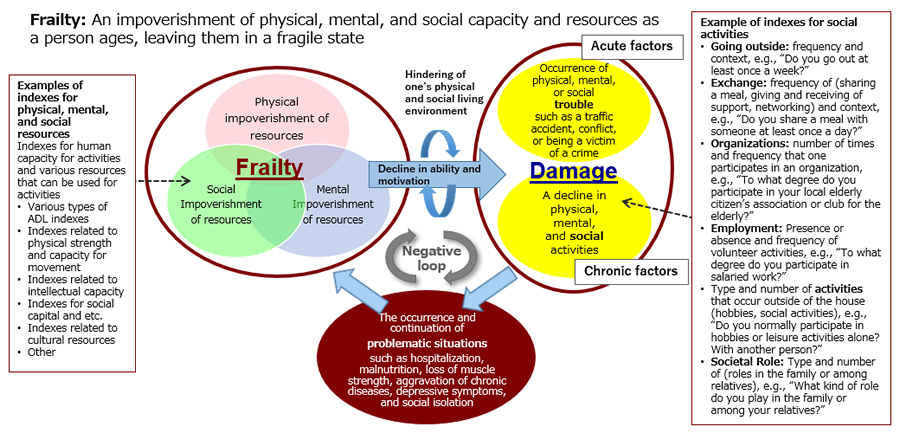Study Development and Trial Run of a Program to Maintain and Improve Social Activity Skill to Extend Healthy and Independent Lifespans in the Elderly
Scientific Research Grants and Challenging Research (Development): 2018–2020 Fiscal Years
Project Overview
It is said that maintaining and improving social activities is effective in preventing frailty (weakness) in the elderly and extending their healthy and independent life span. This study reveals the relationship between frailty and social activities (or the resources for those social activities) from a cross-sectional approach; in addition, we jointly developed a program for the promotion of social activities that contributes to preventing frailty and extending a healthy and independent lifespan. Furthermore, we plan to formulate social development strategies to expand the activity programs in those communities.
Overall Picture of the Study

Study Field
Kashiwa city, Chiba prefecture; Sakai city, Fukui prefecture; Akita city, Akita prefecture; etc.
Study Plan
① Conceptualization of co-ownership, and formulation of a theoretical framework via a review of existing cases by a cross-sectional study group
② Clarification of the mechanisms that advance frailty and decrease social activity
③ Research and development of a community activity program for increasing social activity
④ Formulation of a social development strategy for community activity programs for increasing social activity

Principal Details of the Study
① We will execute a large-scale cohort study on the elderly (in Kashiwa city, Chiba prefecture) and run a multivariate analysis pertaining to mechanisms that advance frailty and decrease social activity. We will formulate a frailty mechanism model (theoretical), such as one that is socially related rather than age related (LSNS-6), for bodily (LOCOMO-25) and cognitive (MMSE) functions, which decrease with age.
② We will examine elderly citizens with a risk of social reclusion to determine why the elderly withdraw from society (Kamaishi city, Iwate prefecture). We have identified the primary question as “Have the elderly have lost the ability to respond to existing ‘social codes’ due to a decrease in bodily and cognitive function?” As a result, the extra effort that is required amplifies their anxiety for living.
③ A program to renew, adjust, and reconstruct existing social codes and then facilitate their adoption is important to promote social activities. We developed two methods to achieve this: the “community activity center” method (Kashiwa city, Chiba prefecture) and the “residential environment verification” method (Sakai city, Fukui prefecture; Akita city, Akira prefecture, etc.). Since this was done under the effects of COVID-19, we continuously developed activities to avoid frailty while also preventing the three Cs (closed spaces, crowds, and close contact).
④ In addition, we conducted an analysis on the relationship of the activity programs and social codes that are easy to understand, maintain, and adopt even with decreased bodily and cognitive function (e.g., enjoying calligraphy, etc.), and then formulated a strategy.
